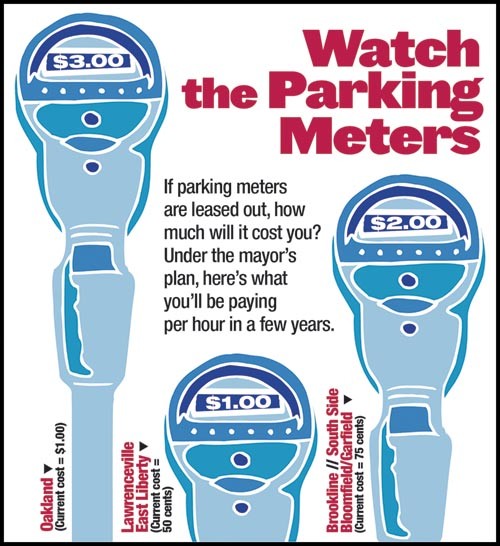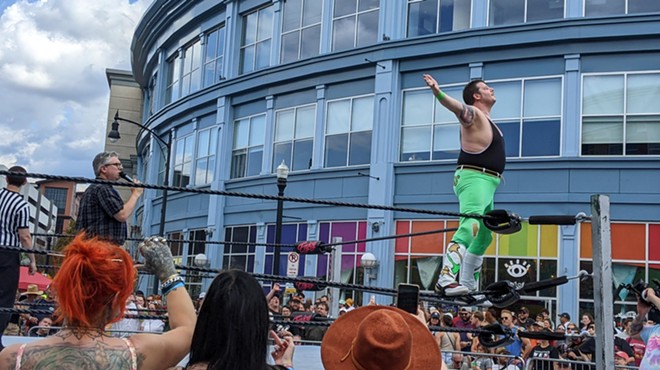In the debate over Mayor Luke Ravenstahl's plan to lease the city's parking facilities, most of the attention has focused on the fate of Downtown's parking garages. But the plan will also increase the rates for parking meters throughout the city. And store owners in smaller neighborhood business districts worry they might be hurt as well.
Under the mayor's plan, hourly meter rates in some neighborhoods could double in less than five years. Neighborhoods like Oakland, Downtown, Shadyside and the Strip District would be hardest hit: Rates there would increase to $3 an hour -- $4.50 an hour Downtown -- by 2014. Other areas, like East Liberty and Lawrenceville, would see a 50-cent hourly hike.
After 2014, meter-rate increases would be limited to the rate of inflation.
Those increases would come just after fines for expired meters were nearly doubled -- from $11 to $20 in much of the city. Fines in Oakland, meanwhile, jumped from $16 to $30.
With such increases back-to-back, "You're going to scare the shoppers," argues Michael Whitlinger, owner of Michael Whitlinger Designs in Brookline. A city-owned garage on Brookline Avenue is closed for repairs, making parking scarce. "We're trying to re-establish our business district here and fight so hard to get people into opening businesses here."
Similar sentiments were expressed in Carrick, where free spaces on one side of Brownsville Road are coveted.
"I have people running out there constantly to feed meters," says Mike Schmitt, a manager at Gary's Restaurant in Carrick. On a recent Wednesday afternoon, available metered spots were few along the Brownsville Road business corridor. (When a City Paper reporter deposited a second quarter into a meter, it jammed.)
At Hess Floral, owner Amy Manns has another problem: finding space for her own delivery vehicle. Manns estimates she pays $5 to park in front of the shop -- if she can get a space. "Where else are you supposed to park?" she says, noting that a nearby side street -- her only close option -- is steep and narrow.
Another complaint: The city's meter network "doesn't have equal pricing throughout Pittsburgh," says Whitlinger. "They should all be the same."
Parking in often-overlooked Brookline, for example, will cost $2 each hour -- the same as you'll pay to park in the bar-and-restaurant destination that is South Side. Meanwhile, Mount Washington, which has 64 meters, could see a $1.25 increase by 2014, whereas East Liberty, with 446, would only see a 50-cent hike.
Scott Kunka, who is city finance director and chairman of the Parking Authority board, says the rates are based on both a neighborhood's current status and how many meters are projected to exist in its future. "If you put a $4-an-hour meter in some parts of the city that aren't economically viable, you're not really gaining anything by doing it."
As for the complaint of business owners like Manns, Kunka says it's a good thing if business owners leave spaces available. "Merchants are interested in having a space available to have people come shop for an hour -- and that's the kind of behavior modification we expect to happen," he says. All-day parkers, he say, should use facilities designated for such, leaving meters for short-term customers. The belief is that higher curb-turnover means more consumers, something that would actually encourage growth in the business districts.
In any case, Kunka says, parking hikes won't kill successful city merchants.
"People who now currently and want to patronize city businesses are going to continue to do that." Meanwhile, he adds, "The people who want to go out to Ross Township and McKnight Road are going to do that no matter."
But talk of parking hikes has made longstanding community grievances worse. At a July 22 press conference called by Pittsburgh city councilors opposed to the plan, Councilor Bruce Kraus, who represents the South Side, was worried about the impact on residents.
"The No. 1 complaint I get is consistently for parking," he said. "There's a history in Pittsburgh that you're going to look for a free space before a pay space." Increasing meter rates, Kraus and other critics have warned, would only make the problem worse, with residents potentially crowded off their own streets by visitors looking to avoid paying a meter. "We want to make sure we're mindful of the residents."
And while business owners fault the city for hiking parking tickets, residents say the fines are barely enforced. At a July 26 hearing on the proposal, one South Side resident argued that weekend revelers take up all of the available parking, not paying even in lots that supposedly have 24-hour enforcement: "No one is monitoring, but it's jam-packed with our drunks."
Even neighborhood parking permits -- meant to ensure residents access to parking -- do little to stanch the flow of visitors looking for a cheap side-street space.
"If they're going to come and enjoy the South Side," another resident contended, "they should have to pay for it just like I do."
In a July 21 presentation to Brookline residents, Ravenstahl acknowledged that there was an "enforcement problem" when it came to parking permits. And he said city lots were not being enforced around the clock, despite what the signs say. Kunka admits the signage is misleading.
"[The] off-street lots do say 'enforcement 24 hours,' and it's not," he says. "So we're going to have to change everything to say what it's really going to be."
Under the city's proposal, however, hours of enforcement will be extended. The proposal calls for expanding enforcement times from 8 a.m. to 10 p.m. Monday through Saturday, and 1 to 10 p.m. on Sunday. There has not been any enforcement on Sundays.
That too has caused consternation. At the July 21 gathering, Pete Wagner -- who owns The Huddle bar in Beechview and is a member of the politically powerful Wagner family -- pleaded with the mayor not to extend meter hours. Allowing visitors to park for free in the evenings was "a gift" to bar owners and restaurants, he said -- one that offset the advantages held by businesses without meters.
Whitlinger believes that the city is "greedy" for going after Sunday traffic. And many neighborhood employees grouse about the fact that they are bearing the cost for bailing out city employees.
"Why do we have to constantly pay into the pension fund? I don't have a 401(k) or a pension. Why should I have to pay?" ask Tara Burns, a waitress at Gary's in Carrick.
City officials contend the plan is the most equitable of the options to shore up the pension fund. Ravenstahl contends that if parking rates aren't increased, the city has few other palatable options. Among the alternatives, Ravenstahl says: laying off 400 police officers or a double-digit property-tax increase.
"If there is a tax increase or layoff of police officers, that only affects city residents," says Kunka. "The parking affects the whole region. ... It just has everyone helping to make the region's hub more viable in the future."



















